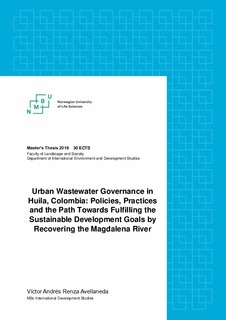| dc.description.abstract | Colombia and Huila have a great wealth of water which is fundamental for the economic progress of the country and the region. However, wastewater management has not been the best at local level with cities that do not have a wastewater treatment plant yet (WWTP). The purpose of this study is to explore the policies on wastewater management, through the analysis of programs, norms and plans on wastewater treatment and reuse and their implementation to later evaluate the governance of wastewater in three municipalities of the department of Huila. Subsequently, this study explores the impact of the Sustainable Development Goals (SDGs), and especially the SDG 6 on clean water and sanitation, in the processes of elaboration and implementation of the regulatory framework and presents some challenges common to the three cities related to governance in general and wastewater governance. This is a qualitative study where primary data has been collected through semi-structured interviews with four types of informants comprising: policymakers/decision makers, public officers, experts and academics and representatives from NGOs/community members. This study also uses secondary data sources such as governmental reports, journal articles, newspaper articles and private publications to guarantee triangulation and validity of the information. The theories of good, effective and equitable governance are used to frame this study and help to conclude that the governance of wastewater in the three municipalities of this study cannot be described as good nor effective and that challenges such as the overproduction of norms, policies and plans as well as the passivity of those taking decisions and the lack of economic and technical capacities represent central barriers for the improvement of wastewater management in the region. Finally, this study calls for a more effective participation of all actors and the use of circular economy modelling to achieve more sustainable projects that could allow them not only to reach the SDGs within the 2030 agenda, to which Colombia is committed, but also generate benefits for all, leaving no one behind. | nb_NO |

